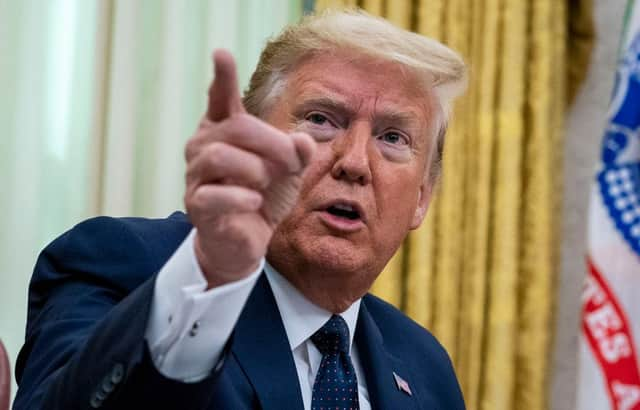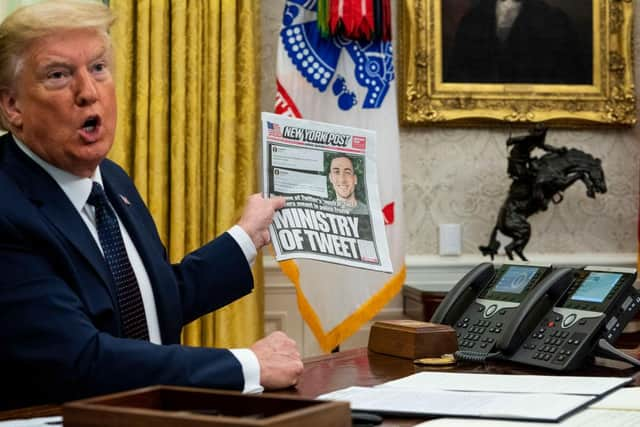Donald Trump Twitter row: why the president’s tweet was hidden, why Facebook has banned adverts featuring ‘Nazi symbols’ - and his executive order explained


The move comes after Trump threatened to "strongly regulate" or shut down platforms in a row over conservative censorship.
Here’s everything you need to know about it:
What does Trump’s order do?


The executive order challenges the liability protections which have allowed unfettered speech on the internet.
Advertisement
Hide AdAdvertisement
Hide AdUnder a 1996 law, website operators like Twitter, Facebook and Google cannot generally be held responsible for content posted by users.
The sites are also protected from lawsuits if they block posts deemed obscene, violent "or otherwise objectionable, whether or not such material is constitutionally protected".
Trump’s order argues this immunity should no longer apply if a social network edits posts, such as by adding a warning or a label.
It also says "deceptive" blocking, including removing a post for reasons other than those described in a website's terms of service, should not be protected.
Why has Trump done this?
Trumps’s order comes at the end of a week in which Twitter added a fact-check label to the President’s Tweets for the first time.
The platform added the warning to two of Trump's Tweets, in which he railed against the use proposed use of mail-in ballots in America's upcoming 2020 election.
"There is NO WAY (ZERO!) that Mail-In Ballots will be anything less than substantially fraudulent," Tweeted the President.
"Mail boxes will be robbed, ballots will be forged & even illegally printed out & fraudulently signed."
Advertisement
Hide AdAdvertisement
Hide AdUnder his posts, Twitter offered users the chance to "get the facts about mail-in ballots".
Twitter say Trump "falsely claimed that mail-in ballots would lead to 'a Rigged Election.'
"However, fact-checkers say there is no evidence that mail-in ballots are linked to voter fraud."
In typically inflammatory fashion, Trump accused Twitter of "completely stifling free speech" and interfering in the US presidential election, currently scheduled for 3 November 2020.
He claimed that he, "as president, will not allow it to happen".
Twitter is a private company, and as such gets to set its own rules for what happens on its platform.
What does ‘When the looting starts the shooting starts' mean?
Twitter also placed a “public interest notice” on a post from Trump about protests in the US city of Minneapolis which said “when the looting starts, the shooting starts”.
Advertisement
Hide AdAdvertisement
Hide AdThe president tweeted after protesters angered by the death of the black man George Floyd in police custody set fire to a police station.
“...These THUGS are dishonouring the memory of George Floyd, and I won’t let that happen. Just spoke to Governor Tim Walz and told him that the Military is with him all the way. Any difficulty and we will assume control but, when the looting starts, the shooting starts. Thank you!” Trump’s tweet read.
It can now only be read after clicking on a disclaimer from Twitter moderators which reads: “This Tweet violated the Twitter Rules about glorifying violence. However, Twitter has determined that it may be in the public’s interest for the Tweet to remain accessible.”
But what does ‘When the looting starts the shooting starts’ mean?
It probably won’t surprise you to learn that it’s not an original quote from Trump. Instead, the President is actually echoing the words of late Miami police chief Walter Headley.
Infamous for his violent reprisals on black protesters in the 1960s, Headley said in 1967 that Miami didn't have problems with race riots “because I've let the word filter down that when the looting starts, the shooting starts.”
“We don't mind being accused of police brutality,” Headley added at the time. “They haven't seen anything yet.”
Will Trump’s order make any difference?
Despite the bluster and symbolic power of the signing of an executive order, it’s unlikely that any real change will come from Trump’s actions, at least in the short term.
Advertisement
Hide AdAdvertisement
Hide AdAnd with the impending presidential election in November, Trump’s proposed changes may never see the light of day.
Federal law will first have to be reviewed by independent government agencies, draft up new regulations, and then have them voted on.
Even some Republicans – including Senator Marco Rubio, who is arguing that the platforms take on the role of a "publisher" - so the likelihood any changes will make it through all of the necessary legal channels is slim.
What have the platforms said?
Twitter has called the order "a reactionary and politicised approach to a landmark law," while Google said changing Section 230 would "hurt America's economy and its global leadership on internet freedom."
"Our platforms have empowered a wide range of people and organisations from across the political spectrum, giving them a voice and new ways to reach their audiences," the firm said in a statement to the BBC.
Facebook's chief executive, Mark Zuckerberg, said censoring a social media platform would not be the "right reflex" for a government concerned about censorship in an interview with Fox News.
"I just believe strongly that Facebook shouldn't be the arbiter of truth of everything that people say online," he said.
However, on 18 June, Facebook removed adverts for US President Donald Trump's re-election campaign that it said featured a symbol used in Nazi Germany.
Advertisement
Hide AdAdvertisement
Hide AdFacebook said the offending ad contained an inverted red triangle similar to that used by the Nazis to label opponents such as communists, but Trump's team said they were aimed at activist group antifa, which it said uses the symbol.
Facebook said the ads violated its policy against organised hate.
